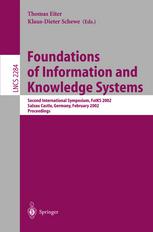

Most ebook files are in PDF format, so you can easily read them using various software such as Foxit Reader or directly on the Google Chrome browser.
Some ebook files are released by publishers in other formats such as .awz, .mobi, .epub, .fb2, etc. You may need to install specific software to read these formats on mobile/PC, such as Calibre.
Please read the tutorial at this link: https://ebookbell.com/faq
We offer FREE conversion to the popular formats you request; however, this may take some time. Therefore, right after payment, please email us, and we will try to provide the service as quickly as possible.
For some exceptional file formats or broken links (if any), please refrain from opening any disputes. Instead, email us first, and we will try to assist within a maximum of 6 hours.
EbookBell Team

4.1
70 reviewsThis volume contains the papers presented at the “Second International S- posium on Foundations of Information and Knowledge Systems” (FoIKS 2002), which was held in Schloß Salzau, Germany from February 20th to 23rd, 2002. FoIKS is a biennial event focusing on theoretical foundations of information and knowledge systems. It aims to bring together researchers working on the theoretical foundations of information and knowledge systems and to attract researchers working in mathematical ?elds such as discrete mathematics, c- binatorics, logics, and ?nite model theory who are interested in applying their theories to research on database and knowledge base theory. FoIKS took up the tradition of the conference series “Mathematical Fundamentals of Database S- tems” (MFDBS) which enabled East-West collaboration in the ?eld of database theory. The ?rst FoIKS symposium was held in Burg, Spreewald (Germany) in 2000. Former MFDBS conferences were held in Dresden (Germany) in 1987, Visegr´ ad (Hungary) in 1989, and in Rostock (Germany) in 1991. Proceedings of these previous events were published by Springer-Verlag as volumes 305, 364, 495, and 1762 of the LNCS series. In addition the FoIKS symposium is intended to be a forum for intensive d- cussions. For this reason the time slot of long and short contributions is 60 and 30 minutes respectively, followed by 30 and 15 minutes for discussions, respectively. Furthermore, participants are asked in advance to prepare as correspondents to a contribution of another author. There are also special sessions for the pres- tation and discussion of open research problems.